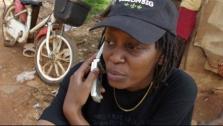Victor has a vision of the perfect world: lesbians, gay men, trans and intersex people can go to their villages — which tend to be rather conservative — and come out to their families.
Victor is transgender and a lesbian. A kuchu.
Kuchu translates as “same.” It’s also a code word for “same sex,” a way for queer people to speak without the rest of Uganda knowing what they’re saying.
Kuchus of Uganda, a feature documentary by Swedish director Mathilda Piehl, tells the stories of members of Sexual Minorities Uganda (SMUG), such as Victor. An umbrella group for four queer organizations, SMUG’s headquarters are in a member’s home because it’s impossible to rent office space or be recognized as a non-governmental organization. The landlady doesn’t know about SMUG. There’s a locked gate in front, but it would be better if the fence were higher. The activist movement is growing. People are speaking out on TV and in the newspapers.
Homosexuality is illegal in Uganda. Victor could be punished with up to 14 years in prison. A private member’s bill is currently before the country’s parliament that would carry a life sentence for homosexual acts and the death penalty for “serial offenders” and people with HIV.
In one scene, members of SMUG are invited to a debate on homosexuality at the Makerere University College of Health Sciences. The Oedipal complex, the Bible, anal ulcerations and social ostracism overwhelm anything that SMUG members have to say. Outside the school, however, Victor and others speak about how colonialism — it was English law that made homosexuality illegal — and religion have created Uganda’s homophobic culture.
Piehl has a background in queer activism. Her previous film was Are You a Girl or What?, a documentary about young lesbian men in Johannesburg. She also works with the Swedish Federation for Lesbian, Gay, Bisexual and Transgender Rights.
Kuchus of Uganda suffers a bit from poor production values, shaky camera work and poor audio. What makes the film compelling — likely the reason it was awarded the Derek Oyston Campaign for Homosexual Equality Film Award at the London Lesbian and Gay Film Festival — is the honesty, courage and hope of people like Victor.
Victor’s early memories of his village, he tells us, are of peaceful times, feasts. Then his parents died, and as he grew up he took to wearing shorts and pants instead of dresses. People rejected him because of his sexuality, and he left. He’s since come back and buys gifts for people so they’ll like him. He knows that can’t last.
Things have to change.

 Why you can trust Xtra
Why you can trust Xtra


